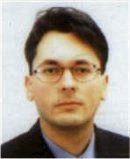|
Plenary
Lecture
How to Investigate the Decision Making Behavior of
Investors in Financial Markets by means of Software
Agents

Professor Filippo Neri
Universita' di Napoli "Federico II"
Dipartimento di Informatica e Sistemistica
Via Claudio 21
80125 Napoli (NA)
Italy
E-mail:
filipponeri@yahoo.com
Abstract:
Financial markets are an example of complex systems
where relevant behavior happens to be a synthesis of
independent and singular decisions taken by individual
entities operating in them. Such is the case of
financial markets where several investors autonomously
decide what investment decision to undertake.
In our work, in particular, we focus our attention to
the following research question: can a software agent
simulation reproduce the behaviour of a significant
financial market time serie by concentrating on many
simple interactions among investors-agents.
This talk takes forward a research line we started to
investigate a year ago and the most promising empirical
findings are reported.
Brief Biography of the Speaker:
Prof. Filippo Neri is currently a professor in Computer
Science at the Department of Computer and System Science
of University of Naples "Federico II".
Prof. Filippo Neri has wide experience in the area of
artificial intelligence, machine learning, and software
agent simulation. He had the opportunity to work both in
academic and industrial environments including
Ericsson's and Unlever's R&D centers and across three
countries in the European Union (Italy, Ireland and UK).
He is currently setting up a spin-off company providing
consulting services for information technology strategy
and management while at the same time advancing his
academic career.
He has studied and visited at several important academic
institutions including Carnegie Mellon University, MIT,
Imperial College London, University of Milano,
University of Torino.
He is a Marie Curie Fellow and an ADI associate, the
Italian PhD association. He is a founding member of
initiatives aiming to close the gap between academia and
the business application of research results.
Finally he has served in the program committees and as
reviewer at several international conferences and he is
author of more than 50 internationally reviewed
publications.
|
